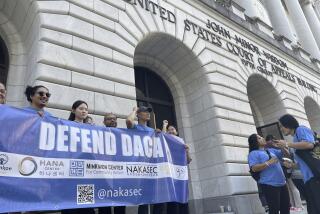One part of Arizona immigration law may be upheld
Reporting from San Francisco — A federal appeals court, reviewing Arizona’s tough new immigration law while protestors outside shouted and waved signs, suggested during a hearing Monday that the state may be permitted to require police to investigate the immigration status of suspected criminals and yet be powerless to do anything about a person’s illegal residency.
During an hourlong hearing, the U.S. 9th Circuit Court of Appeals examined four provisions of the Arizona law that a federal judge in Phoenix blocked as unconstitutional. The three-judge appeals panel appeared largely inclined to agree with the lower court’s July ruling, which said the law usurped the federal government’s sole authority to regulate immigration.
But the panel expressed skepticism about the part of the ruling that blocked the state from requiring police to at least investigate the immigration status of someone stopped on suspicion of a crime.
After a lawyer for the federal government told the court the provision was illegal, a frustrated Judge John T. Noonan Jr., a moderate Republican appointee, noted that federal law permits police to inquire about a person’s immigration status.
On that score, “you don’t have an argument,” the judge told the lawyer for the Obama administration.
Arizona Gov. Jan Brewer, a Republican campaigning for reelection, flew in for the hearing and sat at the front of the courtroom. Brewer signed the legislation known as SB 1070 into law in April, sparking protests around the country from immigrant rights activists who said it would lead to racial profiling.
Brewer’s actions boosted her flagging reelection campaign, while national polls showed that a majority of Americans supported the Arizona law.
After the hearing, the governor said that 22 other states were poised to pass similarly tough laws against illegal immigrants.
“The federal government needs to do its job so Arizona doesn’t have to,” Brewer said.
John J. Bouma, who represented Arizona in the case, told the court that the border state was suffering from serious crimes committed by illegal immigrants who, once in the country, are never sent back.
“Crossing the border is the same as crossing into the finish line,” Bouma said.
Edwin S. Kneedler, the deputy solicitor general representing the Obama administration in challenging the Arizona law, said it infringed on the power of the federal government over foreign relations and could affect U.S. citizens abroad if other countries adopted similar laws.
Comments from the judges suggested they were likely to reject provisions that would make it a crime for an immigrant to fail to carry immigration papers and for illegal immigrants to seek and accept paid work.
Judge Carlos T. Bea, a Republican appointee who was born in Spain, observed that Arizona was attempting to take over the federal government’s responsibility for policing immigration. Bea likened it to a state enforcing federal income tax law.
When Bouma defended a part of the law that permitted the state to punish illegal immigrants for working, Bea said he and his fellow judges were bound by a prior 9th Circuit panel ruling.
“The problem is you are arguing something that is foreclosed to us,” Bea told the lawyer.
Noonan also suggested that parts of the Arizona law went too far. “Isn’t that getting into federal territory?” he asked at one point.
Judge Richard A. Paez, a Democratic appointee, questioned whether Arizona had the legal authority and even the expertise to determine whether a person should be removed from the country.
“Hasn’t the federal government in place an elaborate scheme for determining whether someone is removable or not?” Paez asked, adding, “It is not an easy call.”
UC Hastings Law Professor David I. Levine, who attended the hearing, said afterward that he expected the court would interpret at least one of the provisions — requiring police to investigate a person’s immigration status — as constitutional but would continue to block other controversial provisions.
“This is going to be a mixed verdict,” Levine said. Even though part of the law may be revived, it “may end up being toothless,” he added.
Brewer, at a news conference after the hearing, said Arizona would take its case to the U.S. Supreme Court if necessary. A decision by the 9th Circuit is expected within weeks or months.
Outside the court, nearly 200 protestors against SB 1070 squared off with a smaller group carrying American flags and signs urging the court to uphold the law.
More to Read
Sign up for Essential California
The most important California stories and recommendations in your inbox every morning.
You may occasionally receive promotional content from the Los Angeles Times.










